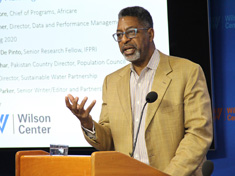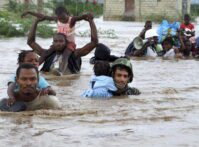-
Franklin Moore: Fostering Local Innovation Through Community Organization
July 20, 2018 By Benjamin Dills Africare’s work has been built on a “strong belief that community mobilization and local capacity building and innovation are the cornerstones of successful development, and that, for us, includes resilience,” says Franklin Moore, Chief of Programs for Africare, in a podcast from a recent Wilson Center event. “Community engagement, capacity building, and looking at locally driven behavior and social change is what empowers communities.”
Africare’s work has been built on a “strong belief that community mobilization and local capacity building and innovation are the cornerstones of successful development, and that, for us, includes resilience,” says Franklin Moore, Chief of Programs for Africare, in a podcast from a recent Wilson Center event. “Community engagement, capacity building, and looking at locally driven behavior and social change is what empowers communities.”Africare’s work has been built on a “strong belief that community mobilization and local capacity building and innovation are the cornerstones of successful development, and that, for us, includes resilience,” says Franklin Moore, Chief of Programs for Africare, in a podcast from a recent Wilson Center event. “Community engagement, capacity building, and looking at locally driven behavior and social change is what empowers communities.”
Africare organizes community committees to identify innovations and behavior changes to make themselves more prosperous and resilient, including climate-smart agricultural techniques and women’s empowerment.
In Niger, agro-pastoral communities rehabilitated land through the use of zai pits and half-moons, traditional farming techniques that retain rainwater for crops. Along with planting drought-resistant cowpea and forage sorghum, these steps enabled the communities Africare worked with to stockpile 57,000 tons of animal forage. During the 2011 drought, these communities were able to feed their livestock using the stored forage even when grazing land was degraded. Livestock death rates dropped 14 percent, and communities that might have otherwise had to sell off their livestock were able to keep them.
Engaging women is key. “In Niger, food security committees are required to have at least 30 percent of their members [be] women,” says Moore, and in Zimbabwe, women make up 80 percent of Africare’s food distribution committees, because in these communities, “food distribution is really something females know a whole lot more about than males.”
Child spacing also contributes women’s empowerment by improving women’s health and ability to participate in livelihood activities. Africare’s “husband schools” teach men about the importance of reproductive healthcare. “When we talk about child spacing, it is critically important that the men know as much or more about this as the women do,” Moore says.
Community-based capacity building programs can change lives. “The organization of the community affects what the community is doing, who the community is, and in fact the size of the community,” says Moore.
This audio was recorded at an event at the Wilson Center on June 12, 2018.
Sources: Ground Swell International
Friday Podcasts are also available for download on iTunes and Google Podcasts.
 A Publication of the Stimson Center.
A Publication of the Stimson Center.

 Africare’s work has been built on a “strong belief that community mobilization and local capacity building and innovation are the cornerstones of successful development, and that, for us, includes resilience,” says
Africare’s work has been built on a “strong belief that community mobilization and local capacity building and innovation are the cornerstones of successful development, and that, for us, includes resilience,” says 




